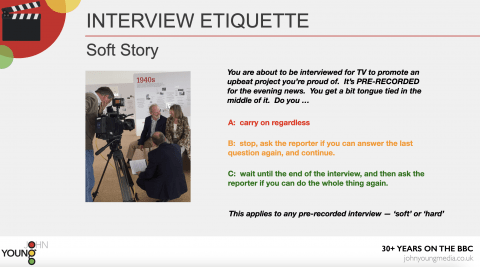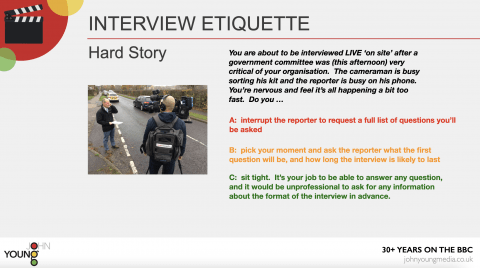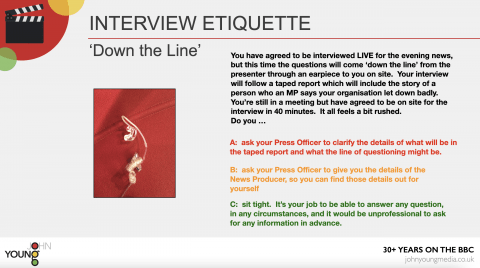How nervous should you be when you’re about to be interviewed by a TV journalist?
For more than thirty years, I took some pride in being a TV reporter who never forgot how nerve-wracking the experience could be for the vast majority of the people I interviewed.
I’ve always believed that everyone was entitled to courtesy and — as the camera operator adjusted the camera, I checked my microphone and their heart rate rose — an understanding of the process they were about to submit themselves to.
The aim of my media training now is to continue that habit: reassuring anxious people, so that they get their messages across, and the reporter gets a decent interview.
In the first thirty minutes or so of most of my media masterclasses, I run a little 3 question quiz. Here’s the first question:

Which option would you choose?
Okay, so you’ve decided on that answer. Now let’s ramp things up.
Let’s say you’re not simply promoting what a journalist might call a ‘soft story’, you’re defending your organisation caught up in the middle of an almighty row — what that journalist would most certainly call a ‘hard story’.
Have the rules changed?

Now let’s take a third scenario.
Let’s imagine now that you’ve again agreed to do the bold thing, but this time the reporter won’t be sitting in front of you — you’ll be live on air that evening from your HQ, with an earpiece in your ear, and the voice of a presenter in the studio asking you questions ‘down the line’.
Does that change things?

I could tease you at this point and say that if you want to know what I think, you’ll have to book me for my Mastering the Media Masterclass.
But I’m a journalist-turned-consultant who now wants to help people as much as I want to earn myself money. So let me tell you what I think right here.
Question 1: I reckon the correct answer is B — to “stop, ask the reporter if you can answer that last question again and continue.”
Why? Because on an upbeat story like this, the reporter doesn’t want a botched answer any more than you do. They want a soundbite that has passion, that’s animated, that helps explain something really clearly. And — especially if they’re on a deadline — they’d rather do it then and there, than wait to the end and try to remember what the question was in the first place.
Question 2: I reckon the correct answer is, in nearly all cases*, also B — “pick your moment, ask the reporter what the first question will be, and how long the interview is likely to last.”
Why? Because you’re entitled to a fair shot at defending something difficult — but to ask for a list of questions in advance would fail to acknowledge that this is a conversation, with the reporter equally entitled to respond to your answers and develop a discussion. It’s only fair, though, that you have an idea of how long the conversation will last, so you can pace your answers and the messages you are entitled to get across.
(*An exception to this might be a senior public figure, who’s widely experienced in live media interviews, paid a generous salary to be accountable, and who should be fully equipped to answer any question that comes their way. But other reporters may disagree with me on this!)
Question 3: I reckon the correct answer would be A — ask your Press Officer to clarify details of what will be in the taped report, and what the line of questioning might be.
Why? Because you have a Comms and Media Relations team for a reason, and it’s their job to have discussions with the journalist. That said, when conducting challenging interviews LIVE from the studio myself, I was always happy to speak direct to the interviewee in advance. It showed courtesy and built trust on both sides, without compromising my ability to be rigorous in the questions I asked.
So — to answer the killer question: who’s really in control?
You both are.
And if that comes as a pleasant surprise, then my job is done.
If you’d like to experience what it’s like to be interviewed for TV — before you actually are — get in touch to find out about my Mastering the Media Masterclasses. They’re aimed in particular at those who are nervous of the media, and I customise them to address the particular issues your organisation may face.